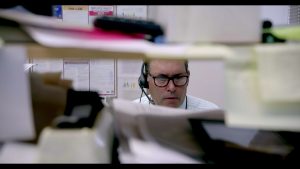Alex Winter may be famous in some circles for his starring roles in Bill and Ted’s Excellent Adventure and its sequel. But in others, he’s become the documentary storyteller of the intersection of politics and technology on the Internet. His Downloaded takes viewers behind the curtain of the Napster controversy, showing how incumbent music interests chose to kill the future rather than adapt, and in the process hinder innovation. His Deep Web describes a massive government response to criminal activity on the Silk Road website, using the Computer Fraud and Abuse Act.
The Panama Papers, about the journalism behind the exposé of corrupt financial practices that hide wealth from taxes, was just released on the premium cable channel EPIX (also online, and with a free 14-day trial). The film follows the journalistic process from the moment a journalist at a small Berlin newspaper got access to the gigantic database, through the process of building an international network of journalists all sworn to cyber-security-enabled secrecy, into the perilous process of research and reveal—including the murder of one of the journalists, and the ongoing risks journalists take to tell these stories that even their editors sometimes find uncomfortable. It’s not just a story about investigations, or high-tech snooping, but ultimately about what the journalists found. They discovered how late capitalism’s biggest beneficiaries walk away from every obligation to contribute to the societies that made them rich. They detailed just how the rich steal good roads and schools and air from the people who do pay their taxes. Their revelations, the film argues, have contributed to overthrowing governments. Alex Winter’s film shows how keenly aware the journalists are of the fundamental significance of their painstaking, dangerous, and impactful work.

Alex Winter
At the International Documentary Film Festival at Amsterdam, where it premiered, he talked about telling compelling stories about complex political issues, and why it matters.
How did you come to an interest in politics from your Hollywood career?
The political awareness and analysis were always there. I grew up in a family of modern dancers and investigative journalists. Even on the modern dance side, they were political activists. So I was born into it.
I started making films when I was young—I began acting professionally when I was nine. But I didn’t ever want to act professionally. I enjoyed acting in movies, but was already making films in college at NYU–short films, music videos. My interest always was primarily nonfiction—culturally topical, politically-oriented storytelling.
And the tech?
I discovered the internet in the early ‘80s, and I found a community I had a lot of affinity with. I also really responded to the political movement there in terms of pro-privacy, anti-surveillance, cypherpunk, a lot of discourse about the Panopticon, mass surveillance.
There was a romance about it–people knew that tech was very powerful and potentially democratizing. I wasn’t blind to the ethical issues. I reached out to Fanning even while Napster was still alive, to explore them. But the possibility Napster promised, of millions of people connected to each other around the world, was very powerful to me. It was like being in the 80s communities that I had lost, the pre-Web BBS and Usenet newsgroups. I was on the 2600 mailing list [an early hacker publication].
I met Sean Parker when he was 19 years old, living on John Perry Barlow’s couch. The Napster folks were people, warts and all, making reckless, young, naïve decisions as well as brilliant ones.
Have you found yourself becoming more politically aware, as tech’s possibilities and implications have unfolded?
The tech and my political ideals and my cinematic goals have always been entwined. I really didn’t see that Napster was any less political than the Panama Papers. When you look at Zuckerberg and Cambridge Analytica, the world is catching up to the fact that those worlds are entwined. But I’ve never taken that for granted. Napster was a political issue, as well as Cambridge Analytica.
Your film Deep Web is sympathetic to Ross Ulbricht, the “Dread Pirate Roberts” of Silk Road. Are you still happy with that choice?
I don’t think it was unduly sympathetic. The government overreach with the Computer Fraud and Abuse Act, which they also used against Aaron Schwartz, was the story here. Ross was at the intersection of all of it. I thought, let’s say he’s guilty, you still shouldn’t give that person a double life sentence without possibility of parole. It was a political case.
This was the moment where the government woke up to the fact that people can have influence from these spaces. What happened in the Silk Road trial will have an impact on government and public policy, which is highly topical—it’s the world we entered with Trump. That’s what I wanted to alert people to in the film.
The reason that the government came down so hard on what was a pretty small, Internet-based black market was because of the threat that it exemplified– the way the Internet can circumvent government control.
The Panama Papers pulls together several of your concerns.

From “The Panama Papers”
Panama Papers is fascinating to me, because it is a digital data leak, about a global corruption network enabled by technology, investigated by journalists enabled by computer-based networks. The journalists created social media hubs, all encrypted, via the Net. There’s a direct line here from Napster’s technology. In fact, it’s almost the same tech.
What were the biggest challenges in telling the story?
What I really wanted to do was have the audience experience what it was like to be within the network of journalists around the world, under threat. First, the threat is internal–your editors didn’t want long-lead investigative journalism. Were you gonna be fired? Would the paper go under? Then there’s threat of the bad guys you’re going after. Are you gonna be sued? Then in the age of Trump, everything is labelled fake news, and you have a cultural threat. What if we break the story and it’s dismissed?
I wanted the audience to experience an extraordinary moment in time. There has never been global coordination at this level, in the digital age, when newspapers going under. I wanted to capture the implications of the Panama Papers’ subject matter at the same time. This wasn’t just about financial dodginess. It was about modern aristocracy.
When Trump says to Clinton, not paying my taxes makes me smart, you have to hear that as, “That is theft of my money, my health care, my drinking water, my ability to have an education.”
But maybe the most challenging part was that it’s not a retrospective story. News was breaking while we were filming. Daphne [Caruana Galizia, a Maltese blogger and part of the network] was killed halfway through production. Stories were breaking, journalists were under threat, Trump was throwing out his bullshit. There was a whole new leak while I was at the Guardian. The challenge was to ride the narrative, and assimilate carefully the new events.
You make big claims in the film about the Panama Papers journalism directly affecting politics—the downfall of Dilma Roussef in Brazil, for instance.
We don’t say the Papers were responsible for the downfall of Roussef, but that the corruption of her government, and the opposing government were further revealed in the Panana Papers, which led to the downfall of both her party and the opposition party. The corruption the journalists exposed was of all the governments. What it was exposing was the system at play.
Pakistan is a good example, like Brazil, of the danger. Opposing parties play chess with each other. In the case of Brazil, all sides were corrupt, and it opened a door to a fascist autocracy. A strong man could come in and say, look at these kleptocrats, I’m taking power. And then people will resist that. It’s a cycle as long as there’s been organized society. The point we make at the end is that Brazil’s ruling class falls apart, but it only means you have collapse. Whether anything good happens next is undetermined, and up to us.
I’m optimistic, though. The US and the UK are the biggest offenders of creating systematic aristocracy and tax fraud. We have giant government in collusion with freewheeling corporatism which jointly dismantle our societies. What we need is reform, not revolution. We don’t want that satisfying a cathartic closure. That’s what happened in Brazil. Revolutions lead to strongmen. Reform is slow, but I do believe it’s gonna happen.
A lot of very sophisticated lawyers, specialists, tax enforcement people, have known about the mechanisms revealed in the Panama Papers for a very long time. The journalistic exposé showed in great detail how these mechanisms work. The rock was lifted completely off of the ground, and exposed how the creatures under the rock function.
That has given people interested in reform the power to say, There’s no way of turning away from it any more. And it’s given them tools to build referendums about this. The US is beginning to look at Delaware, Nevada, and Wyoming [where state laws permit financial practices similar to off-shore tax havens]. I do think it will happen.
We aren’t solving the problem tomorrow. Over the next 25 years a lot of smart people are going to work so that we live in a more transparent world. I don’t think we’ll never have bad guys, or have a socialist utopia, but I think there will be an end to the level of corruption. Bolsonaro won’t make good on his promises, and there will be fear and terror, but it will end.
And what’s next for you?
I’ve been working on a big Frank Zappa documentary for four years already. I have access to the entire vault of his life’s work. I’ve saved a lot of archival material in peril.
